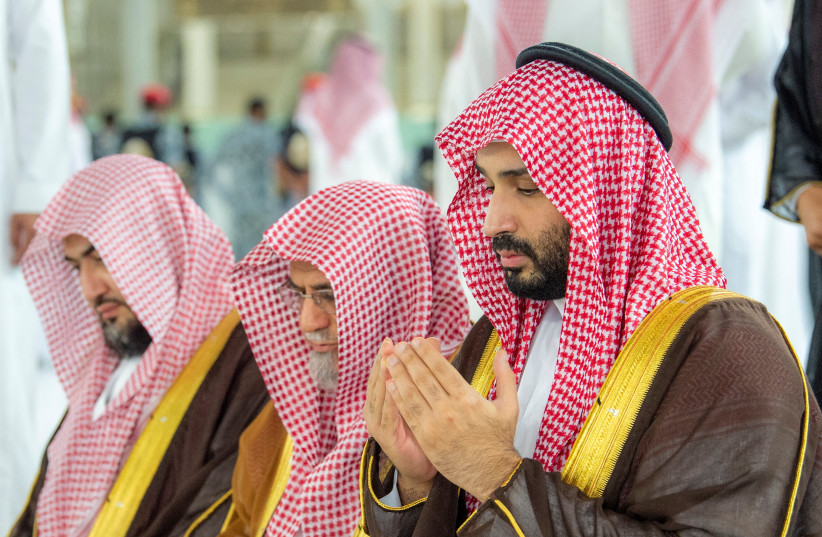Israel-Saudi normalization may be well worth the price – editorial
Although the details are murky, it appears as though the United States is pushing for an agreement with Saudi Arabia that includes normalization of relations with Israel. And while some of the reported conditions of the deal would challenge Prime Minister Benjamin Netanyahu and his current cabinet, the deal itself would be an historic breakthrough in the Middle East and is well worth pursuing.
US President Joe Biden hinted at progress on the deal on Friday, as reported by Reuters. “There’s a rapprochement, maybe, underway,” Biden said tersely, declining to elaborate.
Biden addressed the issue during his visit to Israel and Saudi Arabia last year, and White House officials have reportedly been discussing a major upgrade in security ties with Riyadh, as well as significant Israeli concessions to the Palestinians aimed at keeping alive prospects for a two-state solution to the Israeli-Palestinian conflict.
Indeed, there are signs on the ground of earnest efforts to strike a deal. US National Security Advisor Jake Sullivan, accompanied by White House Middle East czar Brett McGurk and Amos Hochstein, Biden’s senior adviser for energy and infrastructure, traveled to Saudi Arabia last week to meet with Crown Prince Mohammed bin Salman and other top Saudi officials and “discuss bilateral and regional matters, including initiatives to advance a common vision for a more peaceful, secure, prosperous, and stable Middle East region interconnected with the world,” the White House said.
The US is considering the Israeli-Saudi normalization deal
The New York Times reported that Biden had not yet made up his mind on an Israeli-Saudi normalization deal, but he had dispatched Sullivan to discuss the terms. The paper reported that during a previous visit by Sullivan in May, the Saudi Crown Prince had expressed willingness to reach a deal on normalization with Israel, prompting Biden to launch what the paper termed a “full-bore effort.”
 Saudi Crown Prince Mohammed bin Salman performs morning prayer as he arrives to wash the Holy Kabaa on behalf of Saudi King Salman bin Abdulaziz, in the Grand Mosque in the Holy City of Mecca, Saudi Arabia, August 16 2022. (credit: BANDAR ALGALOUD/REUTERS)
Saudi Crown Prince Mohammed bin Salman performs morning prayer as he arrives to wash the Holy Kabaa on behalf of Saudi King Salman bin Abdulaziz, in the Grand Mosque in the Holy City of Mecca, Saudi Arabia, August 16 2022. (credit: BANDAR ALGALOUD/REUTERS)According to Times columnist Thomas Friedman, who is considered close to Biden, among the elements involved in a Saudi-Israeli deal are an official Israeli promise not to annex the West Bank; Israeli commitments not to establish any more settlements, expand the boundaries of existing ones, or legalize illegal outposts; and the transfer of some Palestinian-populated territory in Area C of the West Bank to Palestinian Authority control.
According to Friedman, Riyadh is seeking a NATO-like mutual security treaty that would obligate the US to come to its defense if the kingdom is attacked; a civilian nuclear program monitored and backed by the US; and the ability to purchase more advanced weaponry from Washington such as missile defense systems that could be used by the Saudis to counter Iran’s missile arsenal.
In exchange, the US wants the Saudis to offer a large aid package to Palestinian institutions in the West Bank, significantly roll back their growing relationship with China, and help bring an end to the civil war in Yemen, according to Friedman, who stressed that such a deal could take months to negotiate and is still “a long shot, at best.”
On the domestic Israeli front, Friedman speculated that Netanyahu could be forced to abandon the far-right members in his cabinet who would oppose these terms and instead align himself with centrist political forces in the opposition.
Netanyahu, for his part, has come out strongly in favor of normalization with Saudi Arabia, calling it one of the top priorities of his government. In an interview with Sky News in early June, for example, Netanyahu called a Saudi-Israeli deal “a quantum leap forward” that would change history.
Describing Saudi Arabia as the most influential country both in the Arab and Muslim worlds, Netanyahu said, “It would fashion, I think, the possibility of ending the Arab-Israeli conflict. And I think that would also help us solve the Palestinian-Israeli conflict.”
Pursuing a deal with Saudi Arabia would allow the prime minister to focus on his stated policy agenda and his pledge to expand the Abraham Accords, rather than being bogged down by the debate over his government’s contentious judicial reform.
While Israel’s decision makers would need to seriously weigh the implications of any potential concessions, if normalization with Saudi Arabia means putting the controversial judicial reform on the back burner due to political and diplomatic constraints, that may be a price well worth paying.




Comments are closed.